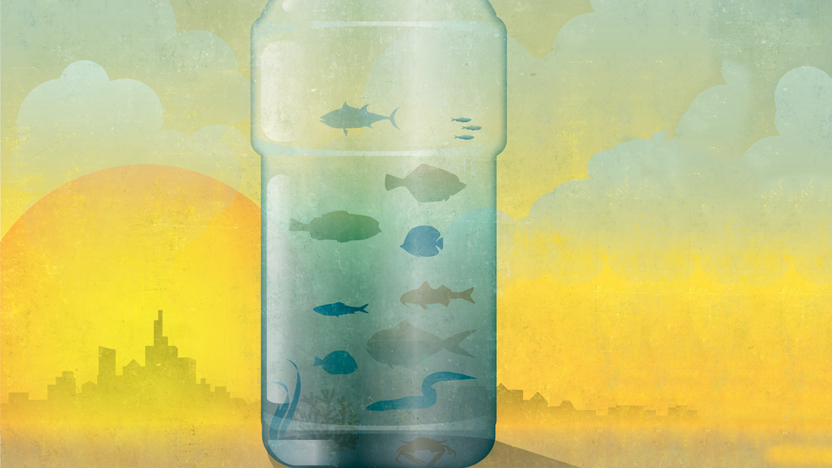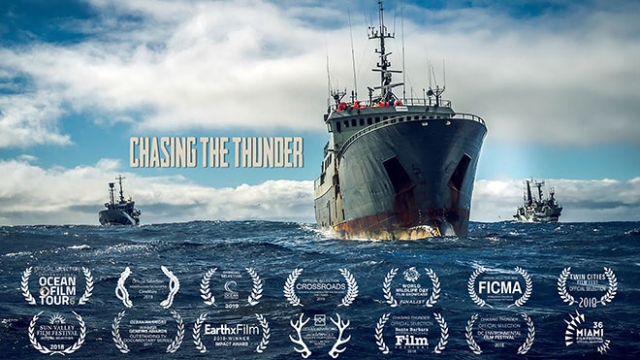2019: The Future of the Global Ocean

“Are the oceans dying?” This question, posed on the cover of Newsweek in 2003, has been repeated with increasing frequency and alarm ever since.
Our planet has been facing a marine environmental crisis for far longer than two decades, yet in recent years marine scientists have vastly increased our understanding of the challenges to ocean health. Overfished, polluted, warming, acidifying, and increasingly laden with plastic debris, the marine environment is in dire straits.
New research in marine science can improve our understanding of ocean health and point in new directions for research. Leading marine scientists will help us explore key environmental topics, from marine protected areas and submarine thermal vents to ocean plastics and the influence of melting sea ice on continental weather patterns.
We will also host a screening of the documentary film Chasing the Thunder, which recounts a remarkable story of environmental activism on the high seas. Sea Shepherd Foundation head Paul Watson and filmmaker Mark Benjamin will introduce and answer questions about the film.
2019 Clifford Symposium Schedule of Events
Thursday, September 19
Science and Conservation in the Largest and Deepest UNESCO World Heritage Site on Earth: The Phoenix Islands Protected Area
The Phoenix Islands Protected Area, in the Republic of Kiribati, is the largest and deepest UNESCO World Heritage Site on the planet. It hosts a diversity of marine ecosystems, including shallow coral reefs, deep sea, and open ocean, and is an important climate laboratory because it is sensitive to El Niño/La Niña dynamics in the Central Pacific. This talk will explore the latest integrative and interdisciplinary science in a conservation context.
The Howard E. Woodin Environmental Studies Colloquium Series kicks off the Clifford Symposium with a talk by Randi Rotjan, research assistant professor at Boston University.
The Orchard, Hillcrest 103, Franklin Environmental Center
Talk by Lisa Gilbert, associate professor of geosciences and marine science at Williams-Mystic, Williams College
The Orchard, Hillcrest 103, Franklin Environmental Center
Plastic debris was first documented in the ocean more than 45 years ago, when global plastics production was only about 10 percent of its current levels. Today we use these materials in virtually all aspects of our daily lives, yet we are appalled when faced with images of our plastic waste in the ocean and in the stomachs of marine wildlife. This presentation will focus on the most current scientific evidence of environmental impacts of ocean plastics, as well as the role of science and environmental scientists in advancing solutions.
Clifford keynote by Kara Lavender Law, research professor of oceanography at the Sea Education Association.
McCullough Student Center, Wilson Hall
Friday, September 20
Whale Watching from the Masthead off New Zealand: Historic and Present Global Whale Populations and Shifting Perspectives on Extinction
During the fall 2018 voyage of the SSV Robert C. Seamans off the coast of New Zealand—an SEA Global Ocean expedition that included two Middlebury students in the Class of 2020—researchers studied a uniquely careful whaleman’s journal from the 1850s and compared this man’s sightings of whales and other marine life to what they observed and sampled.
Using data from the 1850s journal and their own voyage, they created a GIS map, studied shifts in global whale populations, and analyzed what 19th-century whalemen and the general public understood about the health of these populations and how this compares to our perspectives and hindsight knowledge today. This year marks the 200th birthday of Herman Melville, a whaleman himself and the author of Moby-Dick (1851), who had some surprising and often misguided thoughts on whale populations and extinction.
Panel discussion featuring Richard King, visiting associate professor at the Sea Education Association, and Williams-Mystic students from Middlebury Jennifer Crandall ’20 and Caitlin Dicara ’20.
Robert A. Jones ’59 Conference Room
Friday, September 20
Extreme Weather on the Rise, Arctic Ice on the Decline: How Are They Connected?
Does it seem as though the weather gods have gone crazy lately? It is not your imagination. The question on everyone’s minds is, why? And is it related to climate change? In this presentation, Francis will explain new research that links increasing extreme weather events with the rapidly warming and melting Arctic during recent decades. Evidence suggests that Arctic warming is causing weather patterns to become more persistent, which can lead to extremes such as droughts, cold spells, heat waves, unusually snowy winters, and some flooding events.
Talk by Jennifer Francis, senior scientist at Woods Hole Research Center, Falmouth, Massachusetts.
The Orchard, Hillcrest 103, Franklin Environmental Center

With compelling high-seas blue-water action, this eco-thriller is an antipoaching documentary that sees the marine conservation group Sea Shepherd’s vessels chasingthe Thunder, the notorious pirate poacher, to the bottom of the sea.
Film screening, followed by a Q&A and discussion with marine conservation activist Captain Paul Watson and filmmaker Mark Benjamin.
Sunderland Language Center, Dana Auditorium (or McCullough Student Center, Wilson Hall)
Panel discussion featuring Erin Eggleston, assistant professor of biology at Middlebury, and three or four Middlebury College students, followed by closing remarks by Middlebury professor Dan Brayton.
The Orchard, Hillcrest 103, Franklin Environmental Center

